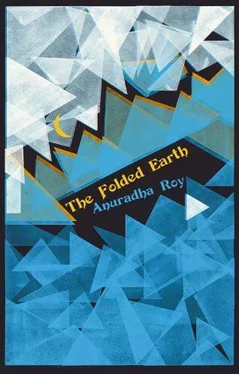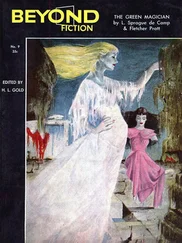I felt something leap inside me. “And deadly,” I said. “Just like those pretty foxgloves. Never go by appearances.”
I could not see his face clearly in the starlight alone, but he seemed to frown and turn away. He switched his torch on again, as if he were about to leave.
“It’s what Diwan Sahib says: we saw valleys covered in foxgloves when we went for walks before,” I said, not ready to confront my empty house yet. “I wanted to pick them because they were so pretty, and he told me how poisonous the prettiest plants and mushrooms in the hills can be.”
Not far from Ranikhet, Diwan Sahib had said, during one of those long walks he and I went on in my first two years, a woman and her child were poisoned by wild mushrooms cooked at home. They ate the mushrooms around a table with five others. Nobody could later remember which of them had eaten the dish with the mushrooms, and which had not. That night, the child’s face turned blue and he began to shiver and vomit. When it was almost dawn, he had a shuddering fit, his muscles relaxed, and he stopped breathing. The mother became bloated as if she had been dredged out days after drowning. She would have exploded if pricked with a pin. They lived in a remote hamlet, and the roads connecting it to the world had been washed away in monsoon rain. No hospital could be reached, though she lived three days more.
Why was nobody else at the table poisoned by those mushrooms? Diwan Sahib said it reminded him of a curious, very old man at the Nawab of Surajgarh’s court, who had been there since the Nawab’s father’s time, and who wore brown clothes and a green pugree and had a face as cavernous as a starving man’s. He walked long hours in the forest and came back with cloth bags full of plants that he disappeared with into his laboratory, which was a quack’s den filled with glass flasks and Bunsen burners and test tubes and vernier callipers, and where, in the instant when the door opened a crack as he slid in, the smells that trickled out were of a kind that existed only in hallucinations and nightmares, so that when he shut the door you wondered if you had imagined them. It was rumoured that he manufactured poisons in that den, and the rumour was strengthened by the inexplicable decline or death from time to time of people at the court who had fallen foul of the Nawab. The Nawab had claimed that the man made medicine, Diwan Sahib said, but the line between medicines and poisons is finely drawn, and this very foxglove, so poisonous and so beautiful, in the correct quantity, produced digitalis, which was medicine for troubles of the heart. “Not devastated hearts,” he had said laughing, “like yours or mine, Maya, for that there is no medicine but death, which too the foxglove can provide.”
By now, despite the chill of the spring night, we were sitting on the steps that led to my front door, inches apart. I could feel the warmth of Veer all along my legs. Twice, by accident, our shoulders touched, and he did not move away. The Scop’s Owl began its low, periodic call, a sound so muted that it emphasised how quiet the hillside had fallen. The pressure cooker had stopped hissing. The clerk’s television had been put to sleep. I saw a curtain flutter at Charu’s house. It was sure to be Ama, eavesdropping. “It’s late,” I said, getting up. “I have been talking on and on. You should go.” The clerk too could see us from his cottage. They would exchange notes tomorrow, while grazing the cows or filling water. “That Teacher-ni — ” Ama would say, before she began embroidering her tale.
Veer saw me looking at Ama’s windows. “Yes, it’s late, and the Ranikhet Town Crier is busy collecting material.” He got up as well and, to my surprise, put an arm around my shoulders and gave me a quick hug. His chin briefly came down and rested in my hair. And then he was gone, the beam from his torch flickering and leaping like a large firefly as he walked away. A few nights before, when he and I had been walking downhill just as we had today, we had seen five dancing fireflies a few feet away and stopped, torch switched off, and for a time that was both as long as eternity and as short as a second, we had stood gazing at the tiny globules of light racing each other, being snuffed out by bushes, then appearing again.
I wrapped my shawl tighter and strolled around my house, brushing past geranium leaves that unloosed clouds of lemony perfume. I thought back to the morning that Michael had left on his last journey. I had gone with him to the station to see him off and we stood on the platform, our hips touching, our shoulders touching, as long as he dared, until departure was announced and the chaos of people on the platform emptied into waving arms, and the train began pulling out. I said, “Go, go, you’ll miss it!” He held me close for an instant, kissed the top of my head, then loped off into the train. That was the last time I saw him, and the last time any man had touched me — until this evening.
The humps of hills all around the spur on which I stood were shadows. After a while, the lights at Ama’s and at the clerk’s went off. In the absolute darkness the sky felt larger, the stars came down, the trees grew blacker. The lopsided half moon was trapped in a cage of branches. Now that I was alone again, a corner of the terror I had felt during the slideshow edged its way back. That woman’s pain-filled face, the ice, the green water — it was not Roopkund, it was a river in Kashmir, but how different could Roopkund be? I felt a shiver go down the back of my neck from some fear I could not define. I was reminded of the way Corbett said he sensed the presence of a man-eating tiger even if he had not seen one: “I felt I was in danger,” he wrote, “and that the danger that threatened me was on the rock in front of me. The fact that I had seen no movement did not in any way reassure me — the man-eater was on the rock, of that I was sure.” I had typed three of Diwan Sahib’s drafts in which those lines appeared and they were engraved on my mind. Corbett’s words had never felt so palpable. Now I understood what he meant, and the apprehension was all the more powerful for being illogical.
I looked up at the stretching limbs of the deodars. The trees were vastly high. Only eagles reached their very top and they told nobody what they saw from there. Each fringed branch was almost large enough to be a tree on its own. For a dizzy moment, it felt as if I were the one human left alive, glued by gravity alone to the edge of a spinning globe, only just keeping myself from being flung off.
That night, I had a vivid dream in which skulls rolled down white slopes and fell into pools of green water. I saw a woman hooded in an anorak, clawing her way up a snowslope. Someone was photographing her as she struggled, saying Smile, say cheese? The voice was Veer’s. Then the woman’s face turned into Michael’s and suddenly he was falling, toppling over the edge of the slope, and as he fell through the white space towards the water, I felt myself falling too, flailing, unmoored, weightless, helpless, until I woke up sweating under my blankets.
It was long past the time for the army bugles. The sun was blazing through the window. It was a holiday. I could hear children playing and the clerk’s boombox pumping out music with a bass beat that resounded across the hillside. Ama’s side of a conversation was taking place in shouts just below my window. Someone had wound barbed wire around my head and set fire to it. I staggered down to the kitchen to make myself coffee. How much rum had I drunk the night before? One at Diwan Sahib’s. And did I have one, or was it two, after Veer left?
I sat at the dining table with my coffee and a painkiller, and noticed a familiar piece of paper on it, weighed down with a jam jar: Diwan Sahib’s electricity bill. He had asked me to deal with it — that was a week ago, and now it was late, so there would be a fine. How much? I looked at the bill — an extra thirty rupees. It was not a lot, and I missed the due date almost every month. But today it made me feel as if someone had just tightened that wire round my head. I covered my aching eyes with my palms and felt them dampen with tears. I was always in trouble with Miss Wilson, my students failed their exams, my house was a mess of old and useless things because I could not bring myself to throw anything away, every month I paid late fines out of my tiny salary because I put things off. The two people most precious to me, my mother and Michael, were dead, and my father was growing old alone in that vast, echoing house in Hyderabad while I was alone in mine, thousands of miles away. Yet he and I, equally implacable, could not find a way back to each other. I put my head on the table and broke into sobs.
Читать дальше












